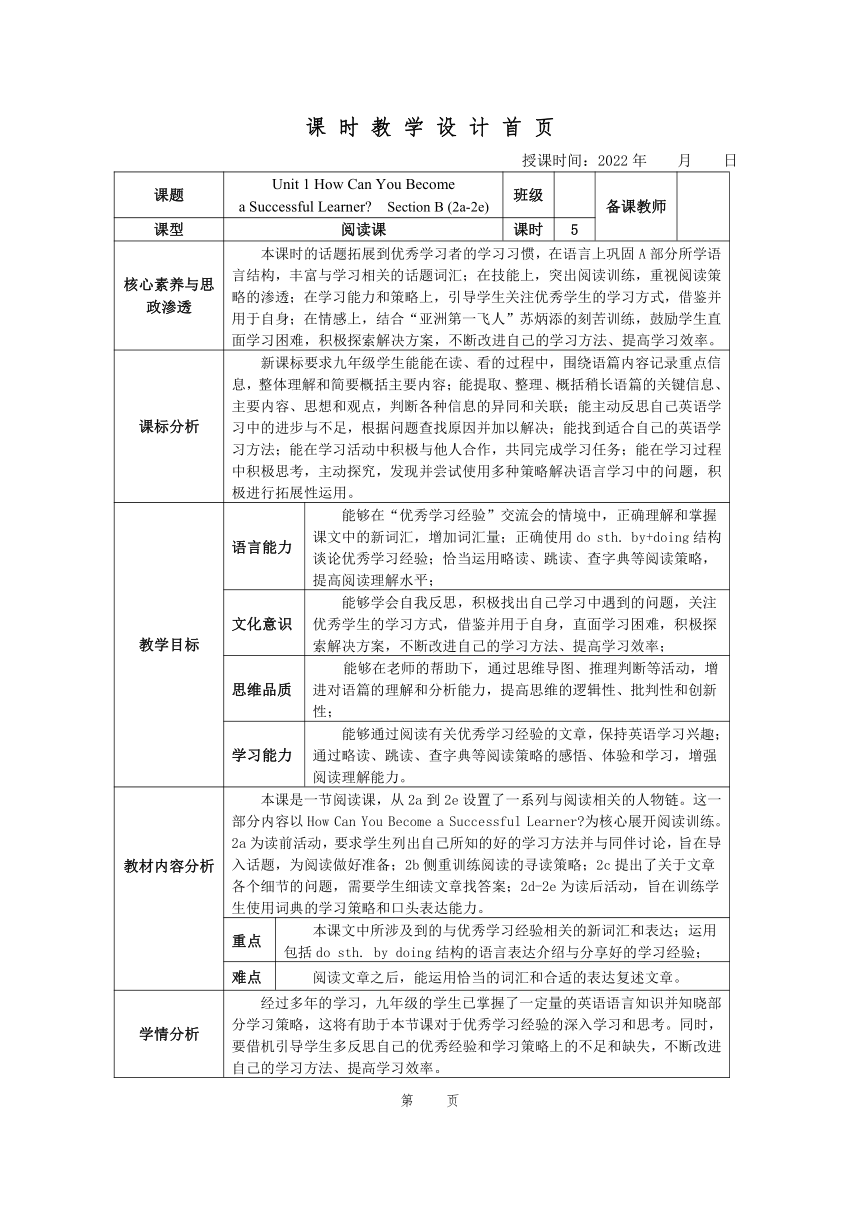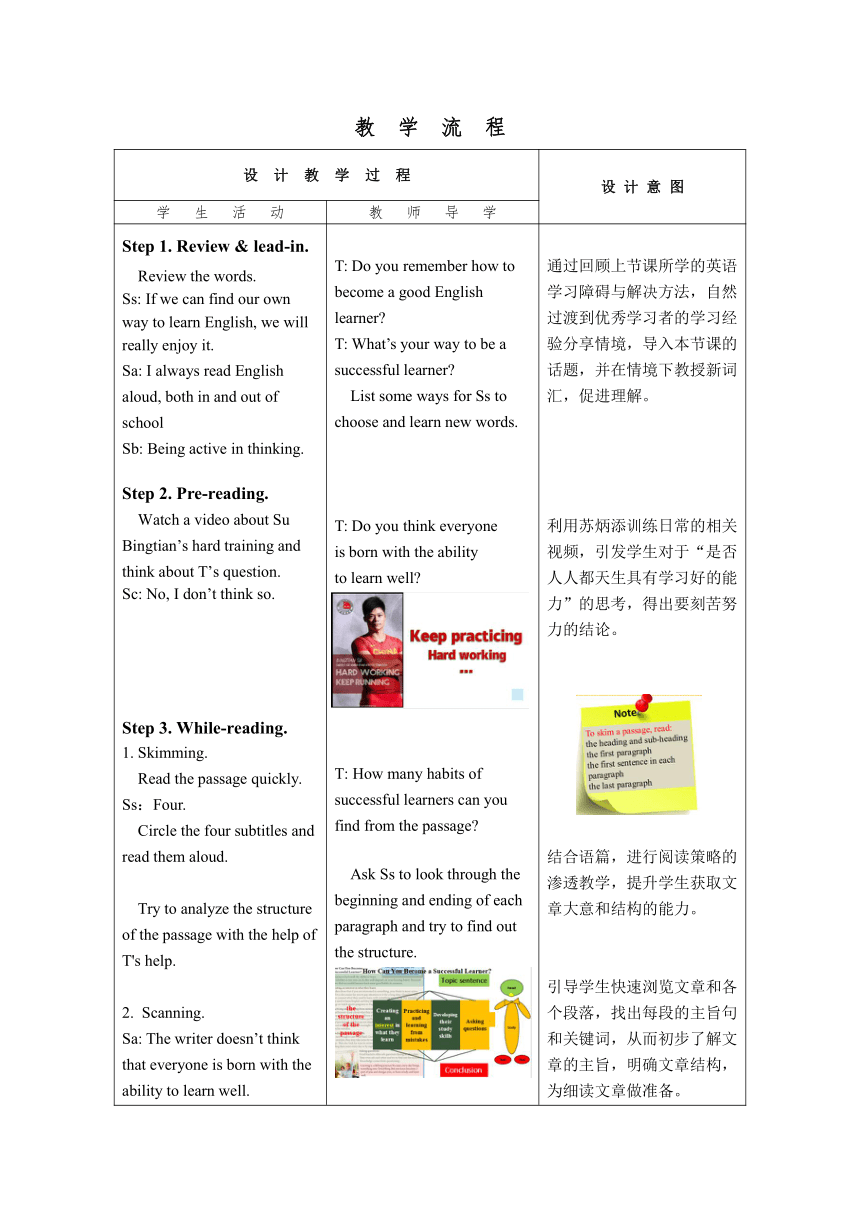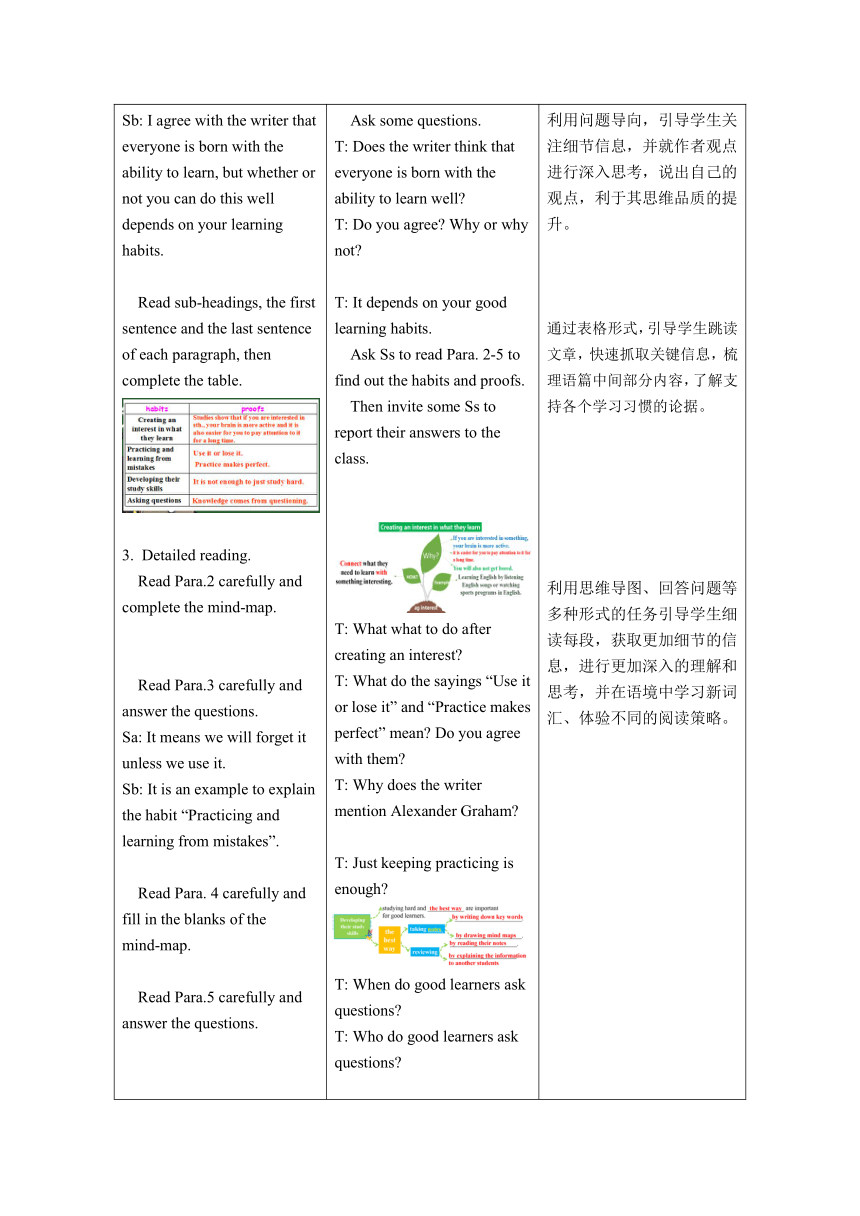人教版九年级全册Unit 1 How can we become good learnersSection B 2a-2e教学设计(表格式,含核心素养目标)
文档属性
| 名称 | 人教版九年级全册Unit 1 How can we become good learnersSection B 2a-2e教学设计(表格式,含核心素养目标) |  | |
| 格式 | docx | ||
| 文件大小 | 1.3MB | ||
| 资源类型 | 教案 | ||
| 版本资源 | 人教新目标(Go for it)版 | ||
| 科目 | 英语 | ||
| 更新时间 | 2024-09-23 19:10:29 | ||
图片预览



文档简介
课 时 教 学 设 计 首 页
授课时间:2022年 月 日
课题 Unit 1 How Can You Become a Successful Learner Section B (2a-2e) 班级 备课教师
课型 阅读课 课时 5
核心素养与思政渗透 本课时的话题拓展到优秀学习者的学习习惯,在语言上巩固A部分所学语言结构,丰富与学习相关的话题词汇;在技能上,突出阅读训练,重视阅读策略的渗透;在学习能力和策略上,引导学生关注优秀学生的学习方式,借鉴并用于自身;在情感上,结合“亚洲第一飞人”苏炳添的刻苦训练,鼓励学生直面学习困难,积极探索解决方案,不断改进自己的学习方法、提高学习效率。
课标分析 新课标要求九年级学生能能在读、看的过程中,围绕语篇内容记录重点信息,整体理解和简要概括主要内容;能提取、整理、概括稍长语篇的关键信息、主要内容、思想和观点,判断各种信息的异同和关联;能主动反思自己英语学习中的进步与不足,根据问题查找原因并加以解决;能找到适合自己的英语学习方法;能在学习活动中积极与他人合作,共同完成学习任务;能在学习过程中积极思考,主动探究,发现并尝试使用多种策略解决语言学习中的问题,积极进行拓展性运用。
教学目标 语言能力 能够在“优秀学习经验”交流会的情境中,正确理解和掌握课文中的新词汇,增加词汇量;正确使用do sth. by+doing结构谈论优秀学习经验;恰当运用略读、跳读、查字典等阅读策略,提高阅读理解水平;
文化意识 能够学会自我反思,积极找出自己学习中遇到的问题,关注优秀学生的学习方式,借鉴并用于自身,直面学习困难,积极探索解决方案,不断改进自己的学习方法、提高学习效率;
思维品质 能够在老师的帮助下,通过思维导图、推理判断等活动,增进对语篇的理解和分析能力,提高思维的逻辑性、批判性和创新性;
学习能力 能够通过阅读有关优秀学习经验的文章,保持英语学习兴趣;通过略读、跳读、查字典等阅读策略的感悟、体验和学习,增强阅读理解能力。
教材内容分析 本课是一节阅读课,从2a到2e设置了一系列与阅读相关的人物链。这一部分内容以How Can You Become a Successful Learner 为核心展开阅读训练。2a为读前活动,要求学生列出自己所知的好的学习方法并与同伴讨论,旨在导入话题,为阅读做好准备;2b侧重训练阅读的寻读策略;2c提出了关于文章各个细节的问题,需要学生细读文章找答案;2d-2e为读后活动,旨在训练学生使用词典的学习策略和口头表达能力。
重点 本课文中所涉及到的与优秀学习经验相关的新词汇和表达;运用包括do sth. by doing结构的语言表达介绍与分享好的学习经验;
难点 阅读文章之后,能运用恰当的词汇和合适的表达复述文章。
学情分析 经过多年的学习,九年级的学生已掌握了一定量的英语语言知识并知晓部分学习策略,这将有助于本节课对于优秀学习经验的深入学习和思考。同时,要借机引导学生多反思自己的优秀经验和学习策略上的不足和缺失,不断改进自己的学习方法、提高学习效率。
第 页
教 学 流 程
设 计 教 学 过 程 设 计 意 图
学 生 活 动 教 师 导 学
Step 1. Review & lead-in. Review the words. Ss: If we can find our own way to learn English, we will really enjoy it. Sa: I always read English aloud, both in and out of school Sb: Being active in thinking. Step 2. Pre-reading. Watch a video about Su Bingtian’s hard training and think about T’s question. Sc: No, I don’t think so. Step 3. While-reading. 1. Skimming. Read the passage quickly. Ss:Four. Circle the four subtitles and read them aloud. Try to analyze the structure of the passage with the help of T's help. Scanning. Sa: The writer doesn’t think that everyone is born with the ability to learn well. Sb: I agree with the writer that everyone is born with the ability to learn, but whether or not you can do this well depends on your learning habits. Read sub-headings, the first sentence and the last sentence of each paragraph, then complete the table. Detailed reading. Read Para.2 carefully and complete the mind-map. Read Para.3 carefully and answer the questions. Sa: It means we will forget it unless we use it. Sb: It is an example to explain the habit “Practicing and learning from mistakes”. Read Para. 4 carefully and fill in the blanks of the mind-map. Read Para.5 carefully and answer the questions. Read Para.6 carefully and answer the questions. Sc: Yes. Because every day brings something new. Sd: Everything that you learn becomes a part of you and changes you. Step 4. Post-reading. Work in groups. Have a discussion with their group members and share their ideas in class then. Step 5. Summary. With the T’s help, sum up the structure of the passage and have a conclusion about the structure of argumentation. T: Do you remember how to become a good English learner T: What’s your way to be a successful learner List some ways for Ss to choose and learn new words. T: Do you think everyone is born with the ability to learn well T: How many habits of successful learners can you find from the passage Ask Ss to look through the beginning and ending of each paragraph and try to find out the structure. Ask some questions. T: Does the writer think that everyone is born with the ability to learn well T: Do you agree Why or why not T: It depends on your good learning habits. Ask Ss to read Para. 2-5 to find out the habits and proofs. Then invite some Ss to report their answers to the class. T: What what to do after creating an interest T: What do the sayings “Use it or lose it” and “Practice makes perfect” mean Do you agree with them T: Why does the writer mention Alexander Graham T: Just keeping practicing is enough T: When do good learners ask questions T: Who do good learners ask questions T: Do you agree that learning is a lifelong journey Why or why not T: Why do people need to learn T: Do you think you are a good learner What learning habits do you think are useful Explain some language points. 通过回顾上节课所学的英语学习障碍与解决方法,自然过渡到优秀学习者的学习经验分享情境,导入本节课的话题,并在情境下教授新词汇,促进理解。 利用苏炳添训练日常的相关视频,引发学生对于“是否人人都天生具有学习好的能力”的思考,得出要刻苦努力的结论。 结合语篇,进行阅读策略的渗透教学,提升学生获取文章大意和结构的能力。 引导学生快速浏览文章和各个段落,找出每段的主旨句和关键词,从而初步了解文章的主旨,明确文章结构,为细读文章做准备。 利用问题导向,引导学生关注细节信息,并就作者观点进行深入思考,说出自己的观点,利于其思维品质的提升。 通过表格形式,引导学生跳读文章,快速抓取关键信息,梳理语篇中间部分内容,了解支持各个学习习惯的论据。 利用思维导图、回答问题等多种形式的任务引导学生细读每段,获取更加细节的信息,进行更加深入的理解和思考,并在语境中学习新词汇、体验不同的阅读策略。 此项活动为阅读后延伸性口语交流活动,旨在训练学生口头表达能力的同时,引导学生养成积极的学习态度,让学生学会或能有意识地结合自身实际选择有效学习方式,以获取学业上的成功。
第 页
课 时 达 标 检 测
Ⅰ. 单项选择。 ( )1. You need to pay attention to ________ as much as possible. A. speaking B. speak C. speaks D. spoken ( )2. The poor boy was born _______ a weak heart. We’re going to raise money for him next week. A. in B. by C. on D. with ( )3. If one is ____ in something, his or her brain is more active. A. interest B. interesting C. interested D. interests D. interests ( )4. You can connect what you need to learn ____ something interesting while learning a language. A. to B. with C. from D. of ( )5.Don’t be afraid of making mistakes. Just keep ____ what you’ve learned. practice B. practiced C. practicing D. to practice Ⅱ.完成句子。 6. 人生来就有思考的能力。 Humans_____ _____ _____ the ability to think. 7. 你是否成功常常取决于你努力的程度。 Whether____ ____ you can succeed usually _______ ____ how hard you work. 8. 对你所学的东西产生兴趣,那么你就不会感到厌倦。 Creating_______ _______ ________ what you learn, you won’t get bored. 9. 你可以通过写下关键词来记笔记。 You can take notes_____ _______ ______ key words. Ⅲ. 适当形式填空。 10.Don't be afraid of ______ (make) mistakes. 11.She was born with the ability_________(learn). 12. Do you enjoy __________(learn) English 13.I often practice____________(speak) English after class. 14.Last night they kept___________(write) new words. 15. It's important for us ___________(learn) English well.
第 页
课 时 教 学 设 计 尾 页
板 书 设 计
Unit 1 How Can You Become a Successful Learner (Section B 2a-2d)
作 业 设 计
Level A Write a proposal(倡议书) to give the students in our school some advice about good learning habits.
Level B Make a list of some good ways to learn Chinese/ math/ English/… for the students in Grade 7. (at least 5 ways)
教 学 反 思
第 页
授课时间:2022年 月 日
课题 Unit 1 How Can You Become a Successful Learner Section B (2a-2e) 班级 备课教师
课型 阅读课 课时 5
核心素养与思政渗透 本课时的话题拓展到优秀学习者的学习习惯,在语言上巩固A部分所学语言结构,丰富与学习相关的话题词汇;在技能上,突出阅读训练,重视阅读策略的渗透;在学习能力和策略上,引导学生关注优秀学生的学习方式,借鉴并用于自身;在情感上,结合“亚洲第一飞人”苏炳添的刻苦训练,鼓励学生直面学习困难,积极探索解决方案,不断改进自己的学习方法、提高学习效率。
课标分析 新课标要求九年级学生能能在读、看的过程中,围绕语篇内容记录重点信息,整体理解和简要概括主要内容;能提取、整理、概括稍长语篇的关键信息、主要内容、思想和观点,判断各种信息的异同和关联;能主动反思自己英语学习中的进步与不足,根据问题查找原因并加以解决;能找到适合自己的英语学习方法;能在学习活动中积极与他人合作,共同完成学习任务;能在学习过程中积极思考,主动探究,发现并尝试使用多种策略解决语言学习中的问题,积极进行拓展性运用。
教学目标 语言能力 能够在“优秀学习经验”交流会的情境中,正确理解和掌握课文中的新词汇,增加词汇量;正确使用do sth. by+doing结构谈论优秀学习经验;恰当运用略读、跳读、查字典等阅读策略,提高阅读理解水平;
文化意识 能够学会自我反思,积极找出自己学习中遇到的问题,关注优秀学生的学习方式,借鉴并用于自身,直面学习困难,积极探索解决方案,不断改进自己的学习方法、提高学习效率;
思维品质 能够在老师的帮助下,通过思维导图、推理判断等活动,增进对语篇的理解和分析能力,提高思维的逻辑性、批判性和创新性;
学习能力 能够通过阅读有关优秀学习经验的文章,保持英语学习兴趣;通过略读、跳读、查字典等阅读策略的感悟、体验和学习,增强阅读理解能力。
教材内容分析 本课是一节阅读课,从2a到2e设置了一系列与阅读相关的人物链。这一部分内容以How Can You Become a Successful Learner 为核心展开阅读训练。2a为读前活动,要求学生列出自己所知的好的学习方法并与同伴讨论,旨在导入话题,为阅读做好准备;2b侧重训练阅读的寻读策略;2c提出了关于文章各个细节的问题,需要学生细读文章找答案;2d-2e为读后活动,旨在训练学生使用词典的学习策略和口头表达能力。
重点 本课文中所涉及到的与优秀学习经验相关的新词汇和表达;运用包括do sth. by doing结构的语言表达介绍与分享好的学习经验;
难点 阅读文章之后,能运用恰当的词汇和合适的表达复述文章。
学情分析 经过多年的学习,九年级的学生已掌握了一定量的英语语言知识并知晓部分学习策略,这将有助于本节课对于优秀学习经验的深入学习和思考。同时,要借机引导学生多反思自己的优秀经验和学习策略上的不足和缺失,不断改进自己的学习方法、提高学习效率。
第 页
教 学 流 程
设 计 教 学 过 程 设 计 意 图
学 生 活 动 教 师 导 学
Step 1. Review & lead-in. Review the words. Ss: If we can find our own way to learn English, we will really enjoy it. Sa: I always read English aloud, both in and out of school Sb: Being active in thinking. Step 2. Pre-reading. Watch a video about Su Bingtian’s hard training and think about T’s question. Sc: No, I don’t think so. Step 3. While-reading. 1. Skimming. Read the passage quickly. Ss:Four. Circle the four subtitles and read them aloud. Try to analyze the structure of the passage with the help of T's help. Scanning. Sa: The writer doesn’t think that everyone is born with the ability to learn well. Sb: I agree with the writer that everyone is born with the ability to learn, but whether or not you can do this well depends on your learning habits. Read sub-headings, the first sentence and the last sentence of each paragraph, then complete the table. Detailed reading. Read Para.2 carefully and complete the mind-map. Read Para.3 carefully and answer the questions. Sa: It means we will forget it unless we use it. Sb: It is an example to explain the habit “Practicing and learning from mistakes”. Read Para. 4 carefully and fill in the blanks of the mind-map. Read Para.5 carefully and answer the questions. Read Para.6 carefully and answer the questions. Sc: Yes. Because every day brings something new. Sd: Everything that you learn becomes a part of you and changes you. Step 4. Post-reading. Work in groups. Have a discussion with their group members and share their ideas in class then. Step 5. Summary. With the T’s help, sum up the structure of the passage and have a conclusion about the structure of argumentation. T: Do you remember how to become a good English learner T: What’s your way to be a successful learner List some ways for Ss to choose and learn new words. T: Do you think everyone is born with the ability to learn well T: How many habits of successful learners can you find from the passage Ask Ss to look through the beginning and ending of each paragraph and try to find out the structure. Ask some questions. T: Does the writer think that everyone is born with the ability to learn well T: Do you agree Why or why not T: It depends on your good learning habits. Ask Ss to read Para. 2-5 to find out the habits and proofs. Then invite some Ss to report their answers to the class. T: What what to do after creating an interest T: What do the sayings “Use it or lose it” and “Practice makes perfect” mean Do you agree with them T: Why does the writer mention Alexander Graham T: Just keeping practicing is enough T: When do good learners ask questions T: Who do good learners ask questions T: Do you agree that learning is a lifelong journey Why or why not T: Why do people need to learn T: Do you think you are a good learner What learning habits do you think are useful Explain some language points. 通过回顾上节课所学的英语学习障碍与解决方法,自然过渡到优秀学习者的学习经验分享情境,导入本节课的话题,并在情境下教授新词汇,促进理解。 利用苏炳添训练日常的相关视频,引发学生对于“是否人人都天生具有学习好的能力”的思考,得出要刻苦努力的结论。 结合语篇,进行阅读策略的渗透教学,提升学生获取文章大意和结构的能力。 引导学生快速浏览文章和各个段落,找出每段的主旨句和关键词,从而初步了解文章的主旨,明确文章结构,为细读文章做准备。 利用问题导向,引导学生关注细节信息,并就作者观点进行深入思考,说出自己的观点,利于其思维品质的提升。 通过表格形式,引导学生跳读文章,快速抓取关键信息,梳理语篇中间部分内容,了解支持各个学习习惯的论据。 利用思维导图、回答问题等多种形式的任务引导学生细读每段,获取更加细节的信息,进行更加深入的理解和思考,并在语境中学习新词汇、体验不同的阅读策略。 此项活动为阅读后延伸性口语交流活动,旨在训练学生口头表达能力的同时,引导学生养成积极的学习态度,让学生学会或能有意识地结合自身实际选择有效学习方式,以获取学业上的成功。
第 页
课 时 达 标 检 测
Ⅰ. 单项选择。 ( )1. You need to pay attention to ________ as much as possible. A. speaking B. speak C. speaks D. spoken ( )2. The poor boy was born _______ a weak heart. We’re going to raise money for him next week. A. in B. by C. on D. with ( )3. If one is ____ in something, his or her brain is more active. A. interest B. interesting C. interested D. interests D. interests ( )4. You can connect what you need to learn ____ something interesting while learning a language. A. to B. with C. from D. of ( )5.Don’t be afraid of making mistakes. Just keep ____ what you’ve learned. practice B. practiced C. practicing D. to practice Ⅱ.完成句子。 6. 人生来就有思考的能力。 Humans_____ _____ _____ the ability to think. 7. 你是否成功常常取决于你努力的程度。 Whether____ ____ you can succeed usually _______ ____ how hard you work. 8. 对你所学的东西产生兴趣,那么你就不会感到厌倦。 Creating_______ _______ ________ what you learn, you won’t get bored. 9. 你可以通过写下关键词来记笔记。 You can take notes_____ _______ ______ key words. Ⅲ. 适当形式填空。 10.Don't be afraid of ______ (make) mistakes. 11.She was born with the ability_________(learn). 12. Do you enjoy __________(learn) English 13.I often practice____________(speak) English after class. 14.Last night they kept___________(write) new words. 15. It's important for us ___________(learn) English well.
第 页
课 时 教 学 设 计 尾 页
板 书 设 计
Unit 1 How Can You Become a Successful Learner (Section B 2a-2d)
作 业 设 计
Level A Write a proposal(倡议书) to give the students in our school some advice about good learning habits.
Level B Make a list of some good ways to learn Chinese/ math/ English/… for the students in Grade 7. (at least 5 ways)
教 学 反 思
第 页
同课章节目录
- Unit 1 How can we become good learners.
- Section A
- Section B
- Unit 2 I think that mooncakes are delicious!
- Section A
- Section B
- Unit 3 Could you please tell me where the restroom
- Section A
- Section B
- Unit 4 I used to be afraid of the dark.
- Section A
- Section B
- Unit 5 What are the shirts made of?
- Section A
- Section B
- Review of Units 1-5
- Unit 6 When was it invented?
- Section A
- Section B
- Unit 7 Teenagers should be allowed to choose their
- Section A
- Section B
- Unit 8 It must belong to Carla.
- Section A
- Section B
- Unit 9 I like music that I can dance to.
- Section A
- Section B
- Unit 10 You're supposed to shake hands.
- Section A
- Section B
- Review of Units 6-10
- Unit 11 Sad movies make me cry.
- Section A
- Section B
- Unit 12 Life is full of the unexpected
- Section A
- Section B
- Unit 13 We're trying to save the earth!
- Section A
- Section B
- Unit 14 I remember meeting all of you in Grade 7.
- Section A
- Section B
- Review of Units 11-14
